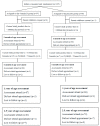In "High-Risk" Infants with Sufficient Vitamin D Status at Birth, Infant Vitamin D Supplementation Had No Effect on Allergy Outcomes: A Randomized Controlled Trial
- PMID: 32545250
- PMCID: PMC7353265
- DOI: 10.3390/nu12061747
In "High-Risk" Infants with Sufficient Vitamin D Status at Birth, Infant Vitamin D Supplementation Had No Effect on Allergy Outcomes: A Randomized Controlled Trial
Abstract
Lower vitamin D status at birth and during infancy has been associated with increased incidence of eczema and food allergies. The aim of this study was to investigate the effect of early infancy vitamin D supplementation on allergic disease outcomes in infants at "hereditary risk" of allergic disease, but who had sufficient vitamin D levels at birth. Here, we report the early childhood follow-up to 2.5 years of age of "high-risk" infants who participated in a double-blinded, randomized controlled trial. For inclusion in this trial, late gestation (36-40 weeks) maternal 25-hydroxyvitamin D levels needed to be ≥50 nmol/L. Infants were randomized to either oral vitamin D supplementation of 400 IU/day (n = 97) or a placebo (n = 98) for the first six months of life. Vitamin D levels and allergic disease outcomes were followed up. There were no statistically significant differences in incidence of any medically diagnosed allergic disease outcomes or allergen sensitization rates between the vitamin D-supplemented and placebo groups at either 1 year or at 2.5 years of age. In conclusion, for "allergy high-risk" infants who had sufficient vitamin D status at birth, early infancy oral vitamin D supplementation does not appear to reduce the development of early childhood allergic disease.
Keywords: allergen sensitization; allergic disease; eczema; hereditary risk; infant; prevention; randomized controlled trial; vitamin D; wheeze.
Conflict of interest statement
The authors declare no conflict of interest. The funders had no role in the design of the study; in the collection, analyses, or interpretation of data; in the writing of the manuscript, or in the decision to publish the results.
References
-
- D’Amato G., Holgate S.T., Pawankar R., Ledford D.K., Cecchi L., Al-Ahmad M., Baker D.J. Meteorological conditions, climate change, new emerging factors, and asthma and related allergic disorders. A statement of the World Allergy Organization. World Allergy Organ. J. 2015;8:25. doi: 10.1186/s40413-015-0073-0. - DOI - PMC - PubMed
Publication types
MeSH terms
Substances
Grants and funding
LinkOut - more resources
Full Text Sources
Medical


